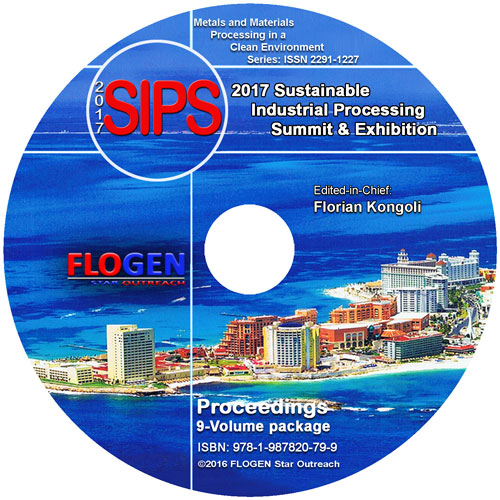2017-Sustainable Industrial Processing Summit
SIPS 2017 Volume 5. Marquis Intl. Symp. / New and Advanced Materials and Technologies
| Editors: | Kongoli F, Marquis F, Chikhradze N |
| Publisher: | Flogen Star OUTREACH |
| Publication date: | 19 December 2017 |
| Pages: | 590 pages |
| ISBN: | 978-1-987820-69-0 |
| ISSN: | 2291-1227 (Metals and Materials Processing in a Clean Environment Series) |

CD shopping page
Non-Pt based Nanoparticles as Low Cost, Highly Efficient and Robust Catalysts Alternative to Pt in Fuel Cell Applications
Sebastian Chirambatte Peter1;1JAWAHARLAL NEHRU CENTRE FOR ADVANCED SCIENTIFIC RESEARCH, Bengaluru, India;
Type of Paper: Regular
Id Paper: 292
Topic: 43
Abstract:
Renewable energy sources such as wind and solar power plants are currently installing to generate electricity and reduce CO2 emissions. However, one of the drawbacks of these energy sources is their availability. Hence renewable power plants either have to be over-engineered to take account of this lower capacity factor, or they must be supported by fast-response open-cycle gas turbines, which also develop environmental issues. The alternate way of solve the energy issue is to store the excess renewable energy generation time for the use during periods when sufficient electricity is not available. However, storing this energy is a difficult task and can be done over a short period of time as in batteries. Energy storage in the form of hydrogen is one such possibility: excess electricity is fed into an electrolyser to split water into its constituent parts, oxygen and hydrogen. A fuel cell combines hydrogen and oxygen to produce electricity, heat, and water. Last two decades, fuel cells have been emerged as one of the most prominent alternate option to current energy conversion technologies, with particularly important applications in transportation. A wide variety of compounds, especially Pt based nanomaterials have been studied for catalytic behaviour for the electro oxidation of methanol, ethanol and formic acid, and oxygen reduction reactions. However due to the poor abundance, high cost and CO poisoning limit its commercial applications. In my talk, I will explain the synthesis aspects on the development of various non-Pt based compounds in nano dimension followed by characterization and electrochemical catalytic activity towards the oxidation of small organic molecules, oxygen reduction and hydrogen evolution reactions. We have strategically used alloying, dealloying, generation of defects, control of size and morphology, designing suitable support to develop active materials. The catalytic activity of a few compounds found par or better than current state-of-the-art Pt based materials. The experimental results are very well supported by the theoretical calculations.